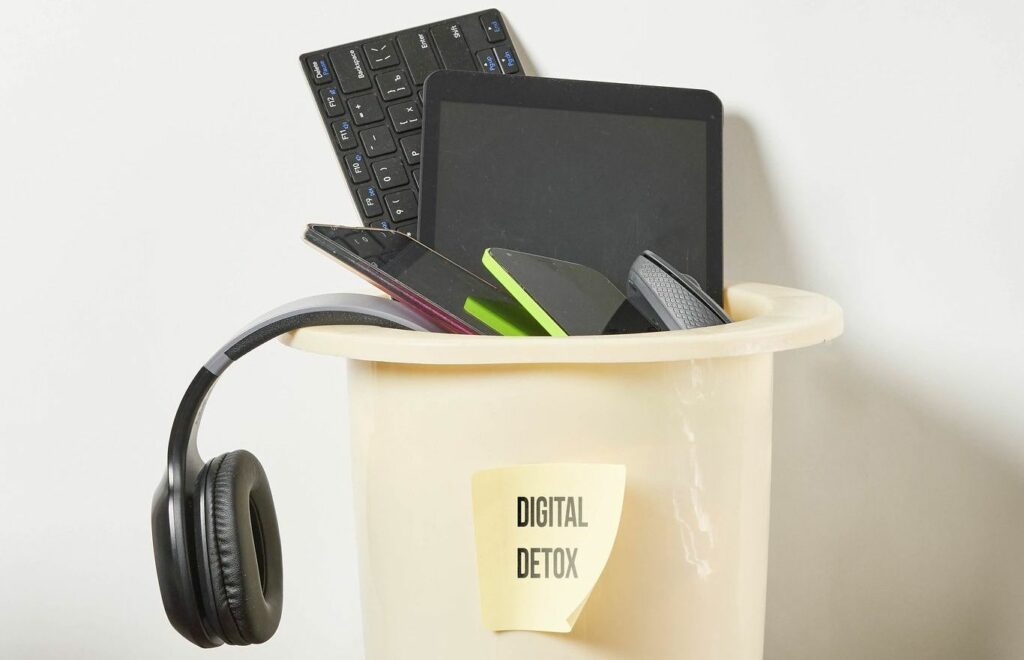Like many people, you probably check your social media accounts right after waking up. You only have a few free minutes before starting your daily routine.
First, you see a highly photoshopped Instagram model with an hourglass figure, then a friend posting about getting his dream job, and finally, a coworker posting an unnecessary political rant. Now you’re insecure about your figure, doubting your career, and frustrated because of the politics. It’s only 7 in the morning.
Social media is an emotional rollercoaster of comparison, judgment, and unwanted opinions. So how do we get off this ride when it’s damaging our mental health?
Table of Contents
What Is Social Media Detox?
The complete elimination of the consumption and usage of social media for a certain period can be defined as social media detox. Most social media detoxes last for 30 days, although some prefer to go for seven days or even a whole year.
Your goal should be to stop using and consuming social media entirely. That includes deleting and suspending all social media applications from your device and temporarily disabling your account if that is feasible. Ideally, avoiding social media during this detox period would be best.
A social media detox will help you clear your mind and consider what’s essential for you and your mental health. If you feel like social media has taken over your life, it has preoccupied your mind, and you find yourself constantly reaching out for your phone, it might be time for a break from social media entirely.
For this social media detox to succeed, you should plan what you will do throughout the day and be productive in your spare time. You will be surprised at how much you can achieve with all the time you would have mindlessly spent on social media.
Why Is It Necessary to Rest Without Social Media?
Taking a break from social media platforms, even for a short period, can be very beneficial. Recent studies showed that FOMO, or “Fear Of Missing Out,” causes the overuse of social media at night, which in turn causes sleep problems and difficulty. According to research in 2019, people who are shown to suffer from an addiction to social media exhibit unique behaviour.
They constantly check for notifications and messages and are at risk of anxiety, depression, and psychological discomfort. Avoiding social media for roughly a week can lower the stress induced by FOMO. Less social media usage leads to increased productivity, efficiency, and better work output, allowing you to take care of more important things.
Signs You Need to Take a Break from Social Media
These are a few significant signs that suggest taking a break from social media might be a good idea. They can be the following:
● It’s no longer enjoyable. Social media platforms like Facebook, Instagram, Twitter, and TikTok are supposed to be a source of entertainment and joy. If they no longer serve their purpose, it might be time to take a break.
● It’s making you self-conscious. Suppose you doubt yourself and every life decision after consuming social media. In that case, it’s not contributing to your mental well-being.
● Doom scrolling. You might catch yourself mindlessly scrolling through Instagram or TikTok, and you may not even realize it. This is known as doom scrolling, which aggravates nervousness and anxiety.
● You are withdrawing yourself socially. Social withdrawal has many adverse outcomes, including socioemotional difficulties, poor-quality friendships, and relationship problems.
● If you feel exhausted by social media, it’s time to take a break. Don’t be afraid of putting your mental health first and taking time out for yourself.

Tips on How to Take a Break from Social Media
Taking a break from social media does not imply that you will be disconnected indefinitely. It’s just a conscious decision to moderate your internet activities to maintain a healthy user pattern.
Here are a few suggestions on how to take a break from social media:
● Cutting off social media entirely might be difficult for you. Instead, start limiting your internet intake to minor levels. This helps boost productivity, enhances your mood, and reduces anxiety and sleeping problems while ensuring the user does not experience loneliness.
● Many people start their social media detox by muting their notifications and alerts. This method helps you resist the urge to constantly check and reply to push notifications. This minor step will keep you from getting dragged away from the present moment.
● Excessive use of social media can reduce real-life interactions, harming an individual’s mental health. Face-to-face conversations, engaging with friends and relatives, and other similar activities can promote a healthy attitude.
● A balance between real life and “reel life”. The key is balancing online and offline interactions to maintain a healthy pattern.
● Avoid using social media applications before sleeping as it disturbs the production of melatonin, the hormone responsible for affecting sleep quality. This step will help you avoid temptations and distractions while encouraging good sleep.
Conclusion
Knowing how to quit social media can potentially enhance your mental health and help you engage in meaningful and mindful ways. It helps maintain a healthy and balanced lifestyle. You may form healthy connections while maintaining a balanced lifestyle. You are the only person who can overcome social media addiction and understand its positive and negative effects on you.
- How to Create a Winning Social Media Strategy for Your Business? - October 12, 2023
- Elevate Your Online Presence: Tips for Better Social Media Use - October 12, 2023
- The Ultimate List of Top Social Media Apps and Sites - October 12, 2023

